一般将来时(讲义及答案)
- 格式:docx
- 大小:28.65 KB
- 文档页数:6
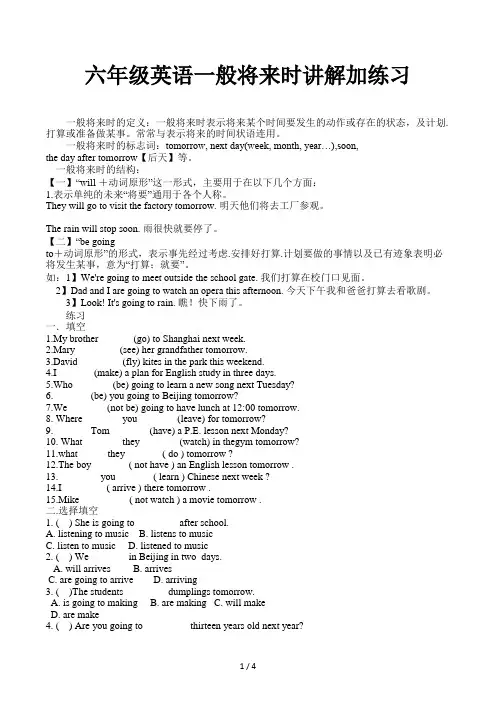
六年级英语一般将来时讲解加练习一般将来时的定义:一般将来时表示将来某个时间要发生的动作或存在的状态,及计划.打算或准备做某事。
常常与表示将来的时间状语连用。
一般将来时的标志词:tomorrow, next day(week, month, year…),soon,the day after tomorrow【后天】等。
一般将来时的结构:【一】“will +动词原形”这一形式,主要用于在以下几个方面:1.表示单纯的未来“将要”通用于各个人称。
They will go to visit the factory tomorrow. 明天他们将去工厂参观。
The rain will stop soon. 雨很快就要停了。
【二】“be goingto+动词原形”的形式,表示事先经过考虑.安排好打算.计划要做的事情以及已有迹象表明必将发生某事,意为“打算;就要”。
如:1】We're going to meet outside the school gate. 我们打算在校门口见面。
2】Dad and I are going to watch an opera this afternoon. 今天下午我和爸爸打算去看歌剧。
3】Look! It's going to rain. 瞧!快下雨了。
练习一.填空1.My brother ______ (go) to Shanghai next week.2.Mary ________ (see) her grandfather tomorrow.3.David ________ (fly) kites in the park this weekend.4.I_______ (make) a plan for English study in three days.5.Who _______ (be) going to learn a new song next Tuesday?6._______ (be) you going to Beijing tomorrow?7.We _______ (not be) going to have lunch at 12:00 tomorrow.8. Where _______ you _______ (leave) for tomorrow?9._______ Tom _______ (have) a P.E. lesson next Monday?10. What _______ they _______ (watch) in thegym tomorrow?11.what _____ they _______( do ) tomorrow ?12.The boy _______( not have ) an English lesson tomorrow .13.________ you _______( learn ) Chinese next week ?14.I ________ ( arrive ) there tomorrow .15.Mike _________ ( not watch ) a movie tomorrow .二.选择填空1. ( ) She is going to ________ after school.A. listening to musicB. listens to musicC. listen to musicD. listened to music2. ( ) We _______ in Beijing in two days.A. will arrivesB. arrivesC. are going to arriveD. arriving3. ( )The students ________ dumplings tomorrow.A. is going to makingB. are makingC. will makeD. are make4. ( ) Are you going to_________ thirteen years old next year?A. will beB. areC. beD. go5. ( ) ___will see a play in 5 days?A. WhenB. WhatC. WhoD. Whose6. ( ) Mary______ English next year.A. will learnB. will to learnC. are going to learn.D. learns7. ( ) He’ll _____ shopping this afternoon.A. goingB. goC. goesD. went8. ( ) Will you ____ at the bus stop at 10:30?A. meetingB. meetsC. meetD. met9. ( ) Lily and I _______ the guitar. next week.A. am going to playB. are going to playC. will playsD. play10. ( ) How ______ Jenny ___ home tomorrow?A. does......goB. is……goingC. will……goD. do……g o11. ( ) Who is going to _________ a song ?A. sings B singing C. to sing D. sing12. ( ) I _________in Beijing in three days.A. are going to arriveB. arriveC. will arriveD. arrives13. ( ) He _______some model planes tomorrow .A. going to makeB. is makingC. will make D makes14. ( ) Are you going to ___________a doctor next year ?A. will beB.. areC. beD. are going to15. ( ) She ________ you make supper this evening .A. helpsB. will helpC. is helpingD. is going help三.把下列句子变成一般疑问句,并给出肯定和否定回答。
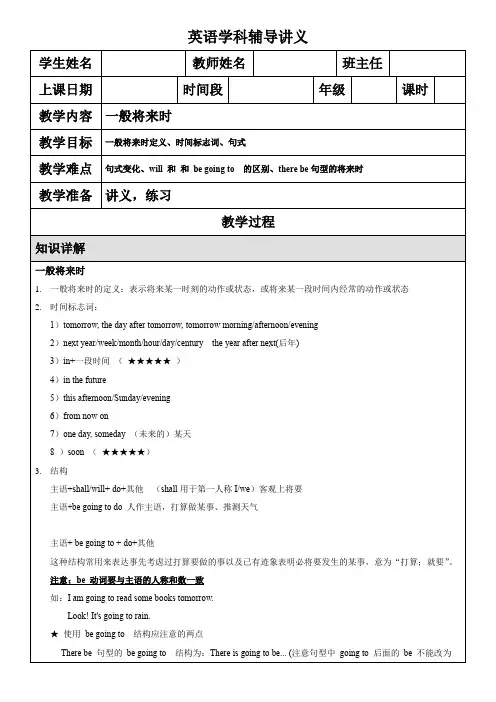
英语学科辅导讲义
一般将来时
1.一般将来时的定义:表示将来某一时刻的动作或状态,或将来某一段时间内经常的动作或状态
2.时间标志词:
1)tomorrow, the day after tomorrow, tomorrow morning/afternoon/evening
2)next year/week/month/hour/day/century the year after next(后年)
3)in+一段时间(★★★★★)
4)in the future
5)this afternoon/Sunday/evening
6)from now on
7)one day, someday (未来的)某天
8 )soon (★★★★★)
3.结构
主语+shall/will+ do+其他(shall用于第一人称I/we)客观上将要
主语+be going to do 人作主语,打算做某事、推测天气
主语+ be going to + do+其他
这种结构常用来表达事先考虑过打算要做的事以及已有迹象表明必将要发生的某事,意为“打算;就要”。
注意:be 动词要与主语的人称和数一致
如:I am going to read some books tomorrow.
Look! It's going to rain.
★使用be going to 结构应注意的两点
There be 句型的be going to 结构为:There is going to be... (注意句型中going to 后面的be 不能改为。
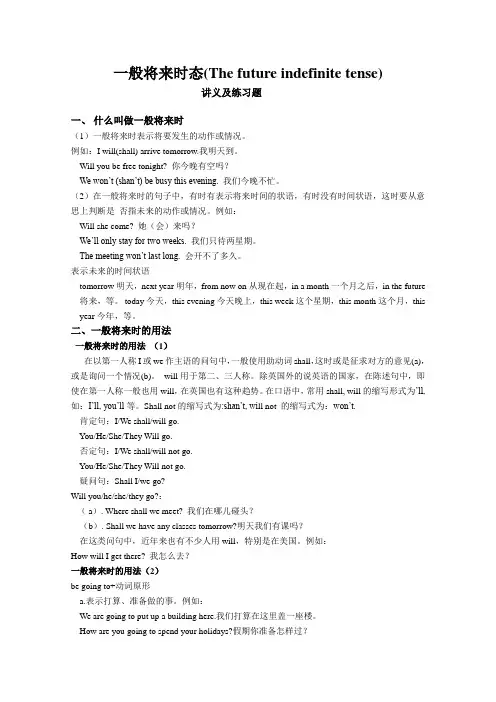
一般将来时态(The future indefinite tense)讲义及练习题一、什么叫做一般将来时(1)一般将来时表示将要发生的动作或情况。
例如:I will(shall) arrive tomorrow.我明天到。
Will you be free tonight? 你今晚有空吗?We won’t (shan’t) be busy this evening. 我们今晚不忙。
(2)在一般将来时的句子中,有时有表示将来时间的状语,有时没有时间状语,这时要从意思上判断是否指未来的动作或情况。
例如:Will she come? 她(会)来吗?We’ll only stay for two weeks. 我们只待两星期。
The meeting won’t last long. 会开不了多久。
表示未来的时间状语tomorrow明天,next year明年,from now on从现在起,in a month一个月之后,in the future 将来,等。
today今天,this evening今天晚上,this week这个星期,this month这个月,this year今年,等。
二、一般将来时的用法一般将来时的用法(1)在以第一人称I或we作主语的问句中,一般使用助动词shall,这时或是征求对方的意见(a),或是询问一个情况(b)。
will用于第二、三人称。
除英国外的说英语的国家,在陈述句中,即使在第一人称一般也用will,在英国也有这种趋势。
在口语中,常用shall, will的缩写形式为’ll, 如:I’ll, you’ll等。
Shall not的缩写式为:shan’t, wi ll not 的缩写式为:won’t.肯定句:I/We shall/will go.You/He/She/They Will go.否定句:I/We shall/will not go.You/He/She/They Will not go.疑问句:Shall I/we go?Will you/he/she/they go?:( a). Where shall we meet? 我们在哪儿碰头?(b). Shall we have any classes tomorrow?明天我们有课吗?在这类问句中,近年来也有不少人用will,特别是在美国。
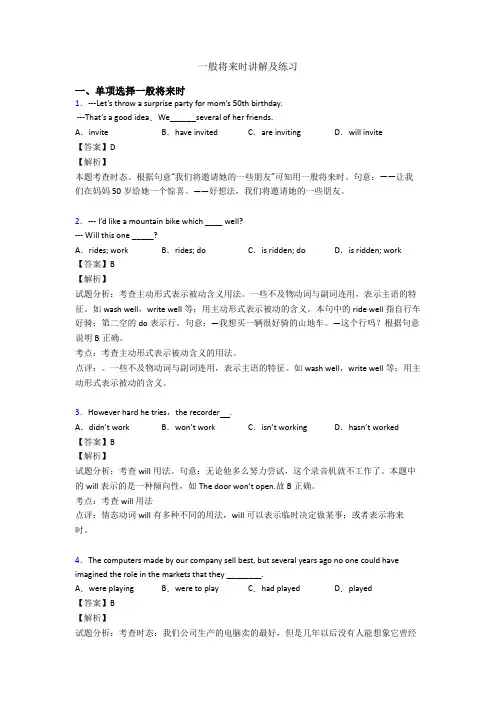
一般将来时讲解及练习一、单项选择一般将来时1.---Let’s throw a surprise party for mom’s 50th birthday.---That’s a good idea.We______several of her friends.A.invite B.have invited C.are inviting D.will invite【答案】D【解析】本题考查时态。
根据句意“我们将邀请她的一些朋友”可知用一般将来时。
句意:——让我们在妈妈50岁给她一个惊喜。
——好想法,我们将邀请她的一些朋友。
2.--- I’d like a mountain bike which ____ well?--- Will this one _____?A.rides; work B.rides; do C.is ridden; do D.is ridden; work【答案】B【解析】试题分析:考查主动形式表示被动含义用法。
一些不及物动词与副词连用,表示主语的特征。
如wash well,write well等;用主动形式表示被动的含义。
本句中的ride well指自行车好骑;第二空的do表示行。
句意:—我想买一辆很好骑的山地车。
—这个行吗?根据句意说明B正确。
考点:考查主动形式表示被动含义的用法。
点评:。
一些不及物动词与副词连用,表示主语的特征。
如wash well,write well等;用主动形式表示被动的含义。
3.However hard he tries,the recorder .A.didn’t work B.won’t work C.isn’t working D.hasn’t worked【答案】B【解析】试题分析:考查will用法。
句意:无论他多么努力尝试,这个录音机就不工作了。
本题中的will表示的是一种倾向性,如The door won’t open.故B正确。
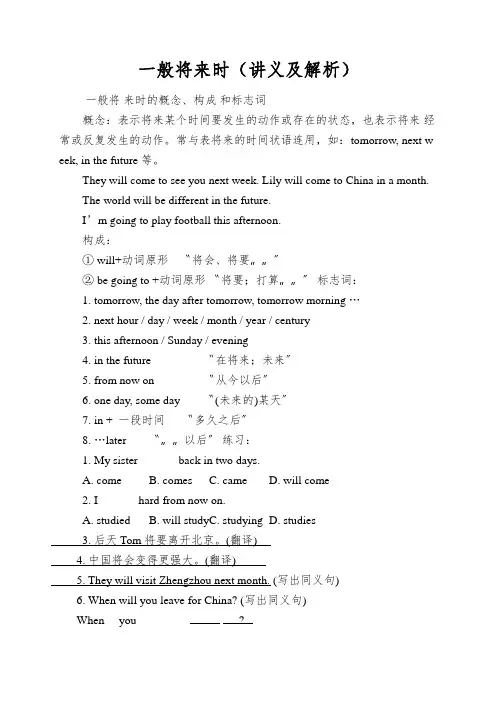
一般将来时(讲义及解析)一般将来时的概念、构成和标志词概念:表示将来某个时间要发生的动作或存在的状态,也表示将来经常或反复发生的动作。
常与表将来的时间状语连用,如:tomorrow, next w eek, in the future 等。
They will come to see you next week. Lily will come to China in a month.The world will be different in the future.I’m going to play football this afternoon.构成:① will+动词原形〝将会、将要……〞② be going to +动词原形〝将要;打算……〞标志词:1. tomorrow, the day after tomorrow, tomorrow morning …2. next hour / day / week / month / year / century3. this afternoon / Sunday / evening4. in the future 〝在将来;未来〞5. from now on 〝从今以后〞6. one day, some day 〝(未来的)某天〞7. in + 一段时间〝多久之后〞8. …later 〝……以后〞练习:1. My sister back in two days.A. comeB. comesC. cameD. will come2. I hard from now on.A. studiedB. will studyC. studyingD. studies3. 后天 Tom 将要离开北京。
(翻译)4. 中国将会变得更强大。
(翻译)5. They will visit Zhengzhou next month. (写出同义句)6. When will you leave for China? (写出同义句)When you ?句式变换She will be angry with him.否定句:She will not be angry with him. /She won’t be angry with him.一般疑问句:Will she be angry with him? 回答:Yes, she will. / No, she won’t. 特殊疑问句:Who will she be angry with?注意:will 可缩写为’ll,will not 可缩写为 won’t /wəʊnt/练习:1. 这个周末他不会去钓鱼。
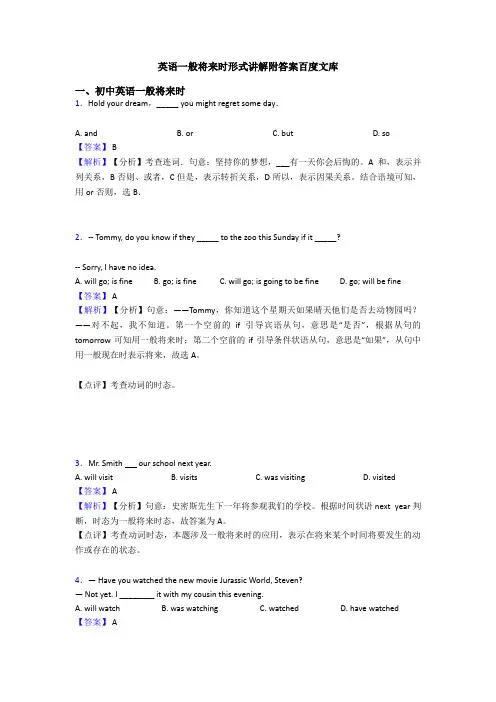
英语一般将来时形式讲解附答案百度文库一、初中英语一般将来时1.Hold your dream,_____ you might regret some day.A. andB. orC. butD. so【答案】 B【解析】【分析】考查连词.句意:坚持你的梦想,___有一天你会后悔的。
A和,表示并列关系,B否则、或者,C但是,表示转折关系,D所以,表示因果关系。
结合语境可知,用or否则,选B.2.-- Tommy, do you know if they _____ to the zoo this Sunday if it _____?-- Sorry, I have no idea.A. will go; is fineB. go; is fineC. will go; is going to be fineD. go; will be fine【答案】 A【解析】【分析】句意:——Tommy,你知道这个星期天如果晴天他们是否去动物园吗?——对不起,我不知道。
第一个空前的if引导宾语从句,意思是“是否”,根据从句的tomorrow可知用一般将来时;第二个空前的if引导条件状语从句,意思是“如果”,从句中用一般现在时表示将来,故选A。
【点评】考查动词的时态。
3.Mr. Smith our school next year.A. will visitB. visitsC. was visitingD. visited【答案】 A【解析】【分析】句意:史密斯先生下一年将参观我们的学校。
根据时间状语next year判断,时态为一般将来时态,故答案为A。
【点评】考查动词时态,本题涉及一般将来时的应用,表示在将来某个时间将要发生的动作或存在的状态。
4.— Have you watched the new movie Jurassic World, Steven?— Not yet. I ________ it with my cousin this evening.A. will watchB. was watchingC. watchedD. have watched【答案】 A【解析】【分析】句意:你看过《侏罗纪世界》这部新电影吗,史蒂文? ——没有。
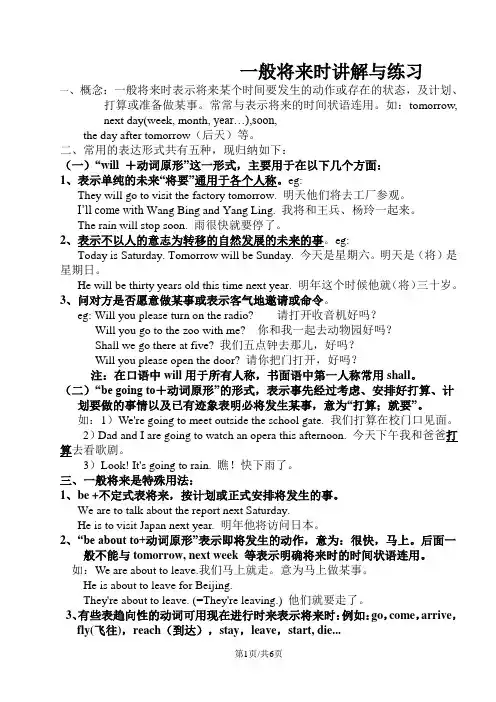
一般将来时讲解与练习一、概念:一般将来时表示将来某个时间要发生的动作或存在的状态,及计划、打算或准备做某事。
常常与表示将来的时间状语连用。
如:tomorrow,next day(week, month, year…),soon,the day after tomorrow(后天)等。
二、常用的表达形式共有五种,现归纳如下:(一)“will +动词原形”这一形式,主要用于在以下几个方面:1、表示单纯的未来“将要”通用于各个人称。
eg:They will go to visit the factory tomorrow. 明天他们将去工厂参观。
I’ll come with Wang Bing and Yang Ling. 我将和王兵、杨玲一起来。
The rain will stop soon. 雨很快就要停了。
2、表示不以人的意志为转移的自然发展的未来的事。
eg:Today is Saturday. Tomorrow will be Sunday. 今天是星期六。
明天是(将)是星期日。
He will be thirty years old this time next year. 明年这个时候他就(将)三十岁。
3、问对方是否愿意做某事或表示客气地邀请或命令。
eg: Will you please turn on the radio? 请打开收音机好吗?Will you go to the zoo with me? 你和我一起去动物园好吗?Shall we go there at five? 我们五点钟去那儿,好吗?Will you please open the door? 请你把门打开,好吗?注:在口语中will用于所有人称,书面语中第一人称常用shall。
(二)“be going to+动词原形”的形式,表示事先经过考虑、安排好打算、计划要做的事情以及已有迹象表明必将发生某事,意为“打算;就要”。
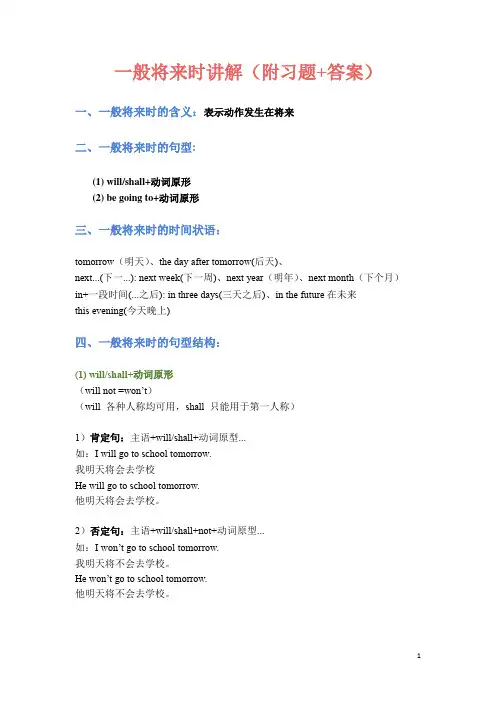
一般将来时讲解(附习题+答案)一、一般将来时的含义:表示动作发生在将来二、一般将来时的句型:(1) will/shall+动词原形(2) be going to+动词原形三、一般将来时的时间状语:tomorrow(明天)、the day after tomorrow(后天)、next...(下一...): next week(下一周)、next year(明年)、next month(下个月)in+一段时间(...之后): in three days(三天之后)、in the future在未来this evening(今天晚上)四、一般将来时的句型结构:(1) will/shall+动词原形(will not =won’t)(will 各种人称均可用,shall 只能用于第一人称)1)肯定句:主语+will/shall+动词原型...如:I will go to school tomorrow.我明天将会去学校He will go to school tomorrow.他明天将会去学校。
2)否定句:主语+will/shall+not+动词原型...如:I won’t go to school tomorrow.我明天将不会去学校。
He won’t go to school tomorrow.他明天将不会去学校。
3)一般疑问句:Will/Shall +主语+动词原型...如:Will you go to school tomorrow?你明天要去学校吗?Will he go to school tomorrow?他明天要去学校吗?肯定回答:Yes, 主语+will.如:Yes, I will.Yes, he will.否定回答:No,主语+will+not.如:No, I won’t.No, he won’t.4) 特殊疑问句:特殊疑问词+will/shall+主语+动词原型...如:What will you do tomorrow?你明天将会做什么?What will he do tomorrow?他明天将会做什么?(2) be going to+动词原形1)肯定句:主语+be going to +动词原型...如:I am going to buy some books tomorrow.我明天打算去买一些书。
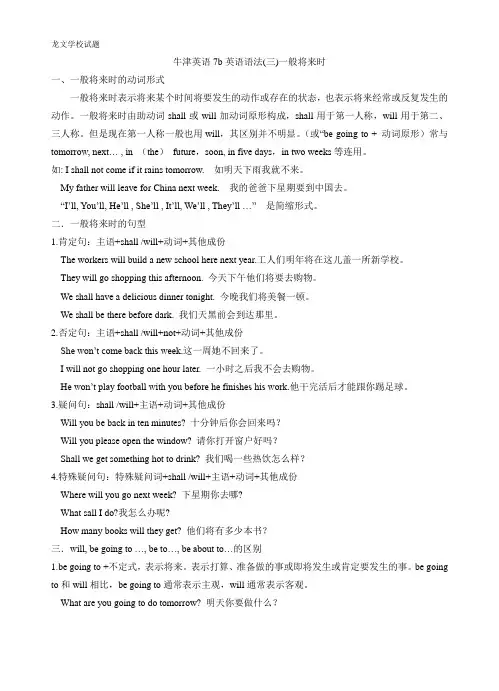
牛津英语7b英语语法(三)一般将来时一、一般将来时的动词形式一般将来时表示将来某个时间将要发生的动作或存在的状态,也表示将来经常或反复发生的动作。
一般将来时由助动词shall或will加动词原形构成,shall用于第一人称,will用于第二、三人称。
但是现在第一人称一般也用will,其区别并不明显。
(或“be going to + 动词原形)常与tomorrow, next… , in (the)future,soon, in five days,in two weeks等连用。
如: I shall not come if it rains tomorrow.如明天下雨我就不来。
My father will leave for China next week.我的爸爸下星期要到中国去。
“I’ll, You’ll, He’ll , She’ll , It’ll, We’ll , They’ll …”是简缩形式。
二.一般将来时的句型1.肯定句:主语+shall /will+动词+其他成份The workers will build a new school here next year.工人们明年将在这儿盖一所新学校。
They will go shopping this afternoon. 今天下午他们将要去购物。
We shall have a delicious dinner tonight. 今晚我们将美餐一顿。
We shall be there before dark. 我们天黑前会到达那里。
2.否定句:主语+shall /will+not+动词+其他成份She won’t come back this week.这一周她不回来了。
I will not go shopping one hour later. 一小时之后我不会去购物。
He won’t play football with you before he finishes his work.他干完活后才能跟你踢足球。
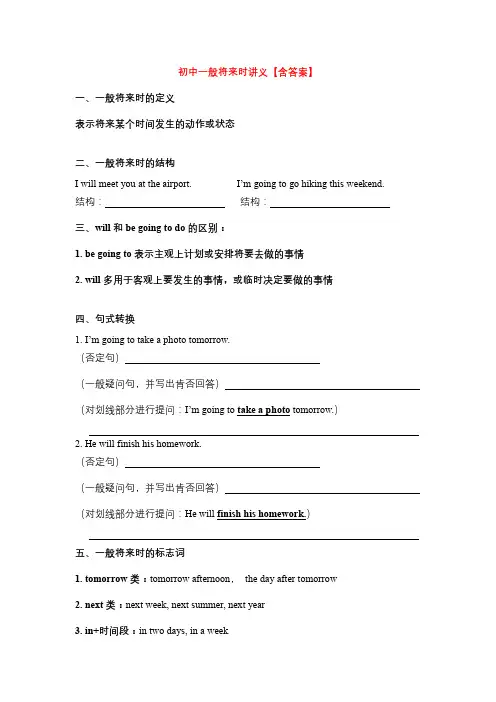
初中一般将来时讲义【含答案】一、一般将来时的定义表示将来某个时间发生的动作或状态二、一般将来时的结构I will meet you at the airport. I’m going to go hiking this weekend.结构:结构:三、will和be going to do的区别:1. be going to表示主观上计划或安排将要去做的事情2. will多用于客观上要发生的事情,或临时决定要做的事情四、句式转换1. I’m going to take a photo tomorrow.(否定句)(一般疑问句,并写出肯否回答)(对划线部分进行提问:I’m going to take a photo tomorrow.)2. He will finish his homework.(否定句)(一般疑问句,并写出肯否回答)(对划线部分进行提问:He will finish his homework.)五、一般将来时的标志词1. tomorrow类:tomorrow afternoon,the day after tomorrow2. next类:next week, next summer, next year3. in+时间段:in two days, in a week4.其他:in the future, one day, someday【课堂练习】1. We don’t know when __________ next week. Please call me when he arrives.A. will he arriveB. does he arriveC. he will arriveD. he arrives2. —How soon will he come back to Guangzhou?—I have no idea. Maybe he __________ in one or two days.A. will comeB. comesC. comeD. came3. ---will the train arrive?---It the station in 50 minutes.A. How soon; will get toB. How soon; arriveC. How long; will reachD. How far; gets to4. Will you at the bus stop at 10:30?A. meetingB. meetsC. meetD. met5. Lily and I to the concert it we free next week.A. go; areB. go; will beC. will go; will beD. will go; are初中一般将来时讲义(答案)一、一般将来时的定义表示将来某个时间发生的动作或状态二、一般将来时的结构I will meet you at the airport. I’m going to go hiking this weekend.结构:will+动词原形结构:am/is/are going to+动词原形三、will和be going to do的区别:1. be going to表示主观上计划或安排将要去做的事情2. will多用于客观上要发生的事情,或临时决定要做的事情四、句式转换1. I’m going to take a photo tomorrow.(否定句)I’m not going to take a photo tomorrow.(一般疑问句,并写出肯否回答)---Are you going to take a photo tomorrow?---Yes, I am. / No, I’m not.(对划线部分进行提问:I’m going to take a photo tomorrow.)What are you going to do tomorrow?2. He will finish his homework.(否定句)He will not finish his homework.(一般疑问句,并写出肯否回答)---Will he finish his homework?---Yes, he will. /No, he won’t.(对划线部分进行提问:He will finish his homework.)What will he do?五、一般将来时的标志词1. tomorrow类:tomorrow afternoon,the day after tomorrow2. next类:next week, next summer, next year3. in+时间段:in two days, in a week4.其他:in the future, one day, someday【课堂练习】1. We don’t know when __________ next week. Please call me when he arrives.A. will he arriveB. does he arriveC. he will arriveD. he arrives2. —How soon will he come back to Guangzhou?—I have no idea. Maybe he __________ in one or two days.A. will comeB. comesC. comeD. came3. ---will the train arrive?---It the station in 50 minutes.A. How soon; will get toB. How soon; arriveC. How long; will reachD. How far; gets to4. Will you at the bus stop at 10:30?A. meetingB. meetsC. meetD. met5. Lily and I to the concert it we free next week.A. go; areB. go; will beC. will go; will beD. will go; are。
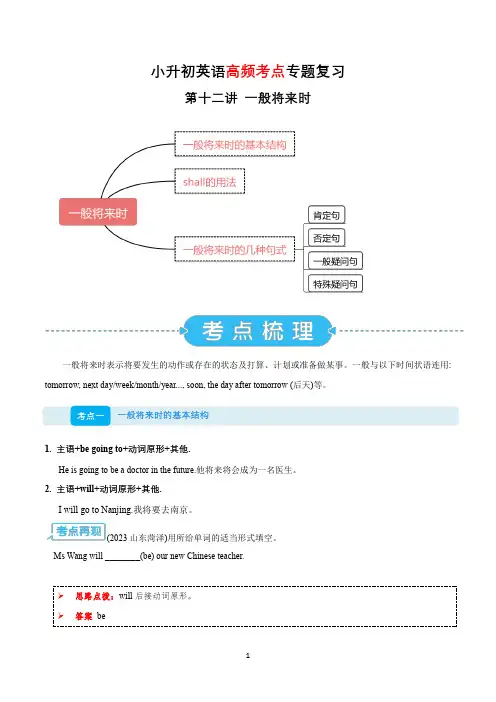
小升初英语高频考点专题复习第十二讲 一般将来时一般将来时表示将要发生的动作或存在的状态及打算、计划或准备做某事。
一般与以下时间状语连用: tomorrow, next day/week/month/year..., soon, the day after tomorrow (后天)等。
1. 主语+be going to+动词原形+其他.He is going to be a doctor in the future.他将来将会成为一名医生。
2. 主语+will+动词原形+其他.I will go to Nanjing.我将要去南京。
(2023山东菏泽)用所给单词的适当形式填空。
Ms Wang will ________(be) our new Chinese teacher.➢ 思路点拨:will 后接动词原形。
➢ 答案 be考点一 一般将来时的基本结构考点二shall 的用法shall也可以表示一般将来时,但只用于第一人称。
如:I shall arrive tomorrow. 我明天到。
Shall we get there a five? 我们要在五点钟到那吗?(2023启东)选择合适的单词,补全句子。
________(Shall/Did) we go to the restaurant tomorrow?➢思路点拨:由tomorrow 可知,本题时态为一般将来时。
shall用于一般将来时,并与第一人称搭配,表示征求意见。
➢答案Shall考点三一般将来时的几种句式1.含有be going to的句型(1)肯定句:主语+ be going to +动词原形+其他。
如:I'm going to have a picnic this afternoon.今天下午我将要去野餐。
(2)否定句:主语+be+ not going to +动词原形+其他。
如:I'm not going to have a picnic this afternoon.今天下午我将不去野餐。
一般将来时(Future Tenses)讲义Grammar – future simple(将来一般时态)(will + 动词原型)Affirmative(肯定方式): I will play / You will play / He/she/it will play / We will play / You will play (pl.) / They will playꢀNegative(否定方式): I will not play / You will not play / He/she/it will not play / We will not play / You will not play / They will not playꢀQuestion(疑问句): Will I play? / Will you play? / Will he/she/it play? / Will we play? /Will you play? / Will they play?Some people have been taught that 'will' is 'the future' in English. This is not correct. Sometimeswhen we talk about the future we cannot use 'will'. Sometimes when we use 'will' we are not talking about the future.We can use 'will' to talk about future events we believe to be certain.•The sun will rise over there tomorrow morning.•Next year, I'll be 50.•That plane will be late. It always is.•There won't be any snow. I'm certain. It's too warm.Often we add 'perhaps', 'maybe', 'probably', 'possibly' to make the belief less certain.•I'll probably e back later.•He'll possibly find out when he sees Jenny.•Maybe it will be OK.•Perhaps we'll meet again some day.We often use 'will' with 'I think' or 'I hope'.•I think I'll go to bed now.•I think she'll do well in the job.•I hope you'll enjoy your stay.•I hope you won't make too much noise.We use 'will' at the moment we make a new decision or plan. The thought has just e into ourhead.•Bye. I'll phone you when I get there.•I'll answer that.•I won't tell him. I promise.Grammar – future simple(将来一般时态)(be (is, am are) going to +动词原型) Affirmative(肯定方式): I am going to play / You are going to play / He/she/it is going to play / We are going to play / You are going to play / They are going to playꢀNegative(否定方式): I am not going to play / You are not going to play / He/she/it is not going to play /We are not going to play / You are not going to play / They are not going to playꢀQuestion(疑问句): Am I going to play? / Are you going to play? / Is he/she/it going toplay? / Are we going to play? / Are you going to play? / Are they going to play?The one which is used most often in spoken English is 'going to', not 'will'.We use 'going to' when we want to talk about a plan for the future.•I'm going to see him later today.•They're going to launch it next month.•We're going to have lunch first.•She's going to see what she can do.•I'm not going to talk for very long.Notice that this plan does not have to be for the near future.•When I retire, I'm going to go back to Barbados to live.•In ten years’ time, I'm going to be boss of my own successful pany.We use 'going to' when we want to make a prediction based on evidence we can see now.•Look out! That cup is going to fall off.•Look at those black clouds. It's going to rain soon.•These figures are really bad. We're going to make a loss.•You look very tired. You're going to need to stop soon.We can replace 'going to go' by 'going'.•I'm going out later.She's going to the exhibition tomorrow.Grammar – future continuous (will +be + ing)Affirmative(肯定方式): I will be doing / You will be doing / He/she/it will be doing / We will be doing / You will be doing (plural)/ They will be doingNegative(否定方式): I will not be doing / You will not be doing / He/she will not bedoing / We will not be doing / You will not be doing / They will not be doingQuestion(疑问句): Will I be doing? / Will you be doing? / Will he/she/it be doing? / Willwe be doing? / Will you be doing? / Will they be doing?We can use 'future continuous' to talk about something that will be in progress at a particularmoment in the future.•This time next week, I'll be sitting on the beach in Barbados.•I'll be thinking about you all back in the office – and I'll be laughing.•We'll be enjoying ourselves too, boss. We won't be doing any work while you are not here.To talk about future events that are fixed or decided.•I'll be visiting your country on a regular basis. In fact, I'm going to be ing next month.•He'll be looking after the factory until we can appoint a new manager.•They'll be thinking about this very carefully over the next few months.To predict what is happening now.•Try phoning his hotel. He'll probably still be having breakfast.•They'll be deciding who gets the contract at this very moment. I'm very nervous.•She's not in her office. She'll be having lunch in the canteen.To ask extremely politely, and with no pressure, about future plans.•Will you be eating with us this evening?•Will you be needing anything else?• Will they be joining us for dinner?Fill in the correct form of the Future Tense. In some sentences several forms are possible.填写正确的将来时形式。
一般将来时讲解及练习(含答案)一、单项选择一般将来时1.— Mr. Gordon asked me to remind you of the meeting this afternoon. Don't you forget it!— Ok, I .A.won't B.don't C.will D.do【答案】A【解析】试题分析:考查时态。
句意:—戈登先生要求我提醒他今天下午要开会。
你千万别忘记了!—好的,我不会忘记的。
根据句意说明使用否定式,而且是说明的以后的事情,要使用将来时。
故A正确。
考点:考查时态2.—Did you tell your parents about the result?—Oh, no, I forgot. I them now.A.will be calling B.will call C.am going to tell D.am to call【答案】B【解析】句意:A 选项是将来进行时,表示将来某个时间正在进行的动作;B、C、D均表示一般将来时。
will+v原形表示临时决定的;而be going to do和be to do是表示按计划或安排要做的事。
根据语境可知说话人是经别人提醒才临时想起要把结果告诉他父母,所以应该用will+v原形。
句意:--你告诉你父母结果了吗?--没有,我忘了。
我现在就去告诉他们。
试题分析:考查动词时态。
考点:考查动词时态。
3.If my brother doesn’t go to the evening party, .A.neither do I B.I will either C.either will I D.nor will I【答案】D【解析】试题分析:考查倒装句:句意:如果我弟弟不去晚会,我也不去。
Neither/Nor+倒装句,表示“…也不是”,因为if条件句用一般现在时,代替一般将来时,所以主句是一般将来时,选D。
一般将来时1.一般将来时的基本概念一般将来时表示将来某一时刻的动作或状态,或将来某一段时间内经常的动作或状态。
一般将来时由助动词shall(第一人称),will(第二、三人称)+动词原形构成。
美国英语则不管什么人称,一律用will.2.一般将来时的形式●will 常简略为 'll,并与主语连写在一起,如:I’ll,he'll,it'll,we’ll,you'll,they’ll。
●一般疑问句如用will you…?其简略答语须是Yes,I will或 No,I will not;如用 Shall you…?(较少见)其简略答语须是 Yes,I shall.或 No, I shall not.。
3.一般将来时的用法1)表示将来的动作或状态一般将来时常与一些表示将来的时间状语连用,如:tomorrow(明天), next week(下周), from now on(从现在开始);in the future(将来)等.2)表示将来经常发生的动作。
4.一般将来时的其他用法一般将来时表示将来某一时刻的动作或状态,其表达形式除了“shall(第一人称),will(第二、三人称)+动词原形构成”外,还有以下几种形式.1)“to be going to+动词原形”表示即将发生的或最近打算进行的事.例如:①It is going to rain。
要下雨了。
②We are going to have a meeting today. 今天我们开会。
2)go, come,start,move,sail,leave,arrive,stay等可用进行时态表示按计划即将发生的动作,例如:I'm leaving for Beijing。
我要去北京.3)“be to+动词原形”表示按计划要发生的事或征求对方意见。
例如:①Are we to go on with this work?我们继续干吗?②The boy is to go to school tomorrow.这个男孩明天要去上学。
1、概述一般将来时表示将来某个时间要发生的动作或存在的状态,常与表示将来的时间状语连用,如tomorrow,next week,next year等。
Why don’t you put the meat in the fridge? It will stay fresh for several days.为什么不把肉放在冰箱里?它可以保鲜好几天。
—You’ve left the light on。
你忘了关灯了。
- Oh , so I have。
I'll go and turn it off。
噢,那我马上去关.2、构成一般将来时由“助动词will/shall+动词原形”构成。
will用于第二、三人称,shall第一人称。
在口语中,will在名词或代词后常缩写为’ll,will not简缩为won’t[wount]。
但在美国英语中,各种人称皆可用will。
He will help his sister with her lessons。
他将帮助他妹妹做功课.We won’t be free this afternoon.今天下午我们没空。
3、一般将来时的用法(1)表示未来的动作或存在状态,常与表示将来的时间状语连用,如tomorrow, next Sunday, soon,in a month, in the future等。
We shall leave for London next Monday.我们将在下周一去伦敦。
He will come to see you the day after tomorrow.后天他要来看你。
You will be 20 next year。
明年你就二十了。
(2)表示将来反复发生的动作或习惯性动作We shall come and work in this factory every year.我们将每年来这工厂参加劳动。
The students will have five English classes per week this term.本学期学生每周将要上五节英语课。
一般将来时讲解与练习五、对划线部分提问。
一般情况,一般将来时的对划线部分有三种情况。
1. 问人。
Who例如:I’m going to New York soon.→Who’s going to New York soon.2. 问干什么。
What … do.例如:My father is going to watch a race with me this afternoon.→What is your father going to do with you this aftern oon.3. 问什么时候。
When.例如:She’s going to go to bed at nine.→When is she going to bed?六、同义句:be going to = willI am going to go swimming tomorrow(明天).= I will go swimming tomorrow.七、be going to和will 的区别be going to和will 的用法虽然都表示将来发生动作或情况,但它们的用法是有区别的。
如:(1)be going to主要用于:1、表示事先经过考虑、安排好打算要做的事情。
E.g. What are you going to do today?今天你们打算做什么?Dad and I are going to see a Beijing opera this afternoon.今天下午我和爸爸打算去看京剧。
I’m going to play the violin.我打算拉小提琴。
Sh e’s going to play the piano.她打算弹钢琴。
2、表示根据目前某种迹象判断,某事非常有可能发生。
E.g. Look! There come the dark clouds. It is going to rain.瞧!乌云密集,天要下雨。
一般将来时一、概念:表示将来的某个时间要发生的动作或存在的状态。
例如:They will leave for Shanghai next week. (他们下周将去上海)I will be a teacher when I grow up. (我长大了要当一个老师)二、时间状语:一般将来时常与表示将来的时间状语连用,例如:tomorrow(明天)、the day after tomorrow(后天)、next+时间词、in+一段时间三、句子结构:一般将来时句子常见有两种句子结构一)、含be动词肯定句:主语+be going to do+其他They are going to play football tomorrow afternoon.他们明天下午打算去踢足球。
否定句:主语+be+not+going to do+其他They are not going to play football tomorrow afternoon.他们明天下午不打算去踢足球。
一般疑问句:Be+主语+going to do+其他Are they going to play football tomorrow afternoon?他们明天下午打算去踢足球吗?特殊疑问句:特殊疑问词+be+主语+going to do+其他What are they going to do tomorrow afternoon?他们明天下午打算去做什么?二)、含行为动词肯定句:主语+will+动词原形+其他We will go to the supermarket tomorrow. 我们明天将会去超市。
否定句:主语+will+not+动词原形+其他We will not go to the supermarket tomorrow. 我们明天将不会去超市。
一般疑问句:Will+主语+动词原形+其他Will go to the supermarket tomorrow.?你们明天将会去超市吗?特殊疑问句:特殊疑问词+will+主语+动词原形+其他Where will you go tomorrow?一、单项选择。
一般将来时(讲义)一般将来时的概念、构成和标志词概念:表示将来某个时间要发生的动作或存在的状态,也表示将来经常或反复发生的动作。
常与表将来的时间状语连用,如:tomorrow, next week, in the future 等。
They will come to see you nextweek. Lily will come to Chinain a month.The world will be different inthe future.I’m going to play football thisafternoon.构成:① wil l+动词原形“将会、将要……”;② be going to +动词原形“将要;打算……” 标志词:1. tomorrow, the day after tomorrow, tomorrowmorning …2. next hour / day / week / month /year / century3. this afternoon / Sunday /evening4. in the future “在将来;未来”5. from now on“从今以后”6. one day, some day “(未来的)某天”7. in + 一段时间“多久之后”[8. …lat er “……以后”练习:1. My sister backin two days.A. comeB. comesC. cameD. will come2. I hardfrom now on.A. studiedB. will studyC. studyingD. studies3. 后天Tom 将要离开北京。
(翻译)4. 中国将会变得更强大。
(翻译)5. They will visit Zhengzhou next month. (写出同义句) |6. When will you leave for China (写出同义句)When you句式变换She will be angry with him.否定句:She will not be angry with him. /She won’t be angry with him.一般疑问句:Will she be angry withhim 回答:Yes, she will. / No, shewon’t. 特殊疑问句:Who will she beangry with注意:will 可缩写为’l l,will not 可缩写为won’t /wəʊnt/练习:1. 这个周末他不会去钓鱼。
He go .2. 下个月她要来郑州吗Will she3. I will become a teacher next year. (变为一般疑问句)4. I will become a teacher next year. (就划线部分提问)注意1. 在表示“带意愿色彩的将来”时,常用助动词will。
如:I will tell you all about it.2. 疑问句中,主语是第一人称 I 或 we 时,常用助动词shall。
如:When shall we have the partyWhen and where shall we meet3. 书面语中,主语是第一人称I 或we 时,常用助动词shall。
如:I shall write you a letter next month.但在口语中所有人称都可以用will。
4. will 常缩略为’ll,will not 常缩略为won’t 。
如:I’ll go there.I won’t go there.there be 句型的一般将来时1. will 放在there be 中构成there will b e…,表“某时/某地将要有……”There will be a sports meeting in ourschool. There will be two basketballmatches next week.2. 句式变换There will be a film this evening.否定句:There won’t be a film this evening.一般疑问句:Will there be a film thisevening 回答:Yes, there will. / No,there won’t. 特殊疑问句:When willthere be a film 练习:1. 动物园将要有一场表演。
(翻译)2. There will be many visitors tomorrow. (变为一般疑问句并进行否定回答)3. There will be two football matches tomorrow. (就划线部分提问) Exercises一、单选( )1. Put your hands behind your back. Don’t speak. We’ll in ten minutes.A. backB. be backC. are backD. are back to you( )2. My parents will come back three hours.A. onB. inC. nextD. at( )3. Two weeks he will leave for Beijing.A. inB. afterC. laterD. behind( )4. I’m s orry I left the book at home. I it here tomorrow,I promise.A. bringB. will bringC. broughtD. brings( )5. He very busy now, but he free this afternoon.A. will be; isB. is; isC. will be; will beD. is; will be( )6. They any classes next week.A. hadB. haveC. will haveD. won’t have( )7. I hope your dream _ true one day.A. comeB. comesC. will comeD. came( )8. This term over. The summer vacation iscoming in two weeks.A. isB. wasC. willD. will be( )9. Mary here next month.A. isn’t workB. doesn’t workC. isn’t going to workingD. won’t work( )10. —When you reading the book—It’s hard to say. I’m busy recently.A. did; finishB. do; finishC. will; finishD. is; finished( )11. —Where is Mr. Lee I have something important to tell him.—You find him here. He has gone to (去了) Japan.A. won’tB. don’tC. aren’tD. didn’t( )12. There a football match and a concert this weekend.Which one would you like to goA. isB. areC. will beD. will have( )13. “There a meeting next Tuesday.” means “Theya meeting next Tuesday.”A. will be; will beB. will have; will haveC. will be; will haveD. will have; will be( )14. —Will there be any paper money in 100 years—. Everyone will have a credit card.A. Yes, there isB. No, there isn’tC. Yes, there willD. No, there won’t( )15. —you free tomorrow—No. I free the day after tomorrow.A. Are; going to; willB. Are; going to be; willC. Are; going to; will beD. Are; going to be; will be二、完成句子16. He flew a kite with Tom last weekend. (用next weekend 改写句子)17. I will be a reporter. (写出同义句)I _ a reporter.18. She will go abroad next year. (改为否定句)19. They will meet at school. (就划线部分提问)20. 后天有一场电影。
(翻译)【参考答案】一般将来时的概念、构成和标志词练习:1. D2. B3. Tom will leave Beijing the day after tomorrow.4. China will become stronger.5. They are going to visit Zhengzhou next month.6. are; going to leave for China句式变换练习:1. won’t; fishing this weekend2. come to Zhengzhou next month3. Will you become a teacher next year4. What will you become nextyear There be 句型的一般将来时练习:1. There will be a show in the zoo.2. Will there be many visitors tomorrowNo, there won’t.3. How many football matches will there be tomorrow Exercises一、1—5:BBCBD 6—10:DCDDC 11—15:ACCDD二、16. He will fly a kite with Tom next weekend./ He is going to fly a kite with Tom next weekend.17. am going to be / am going to become18. She won’t go abroad next year.19. Where will they meet20. There will be a movie the day after tomorrow./ There is going to be a movie the day after tomorrow.>。